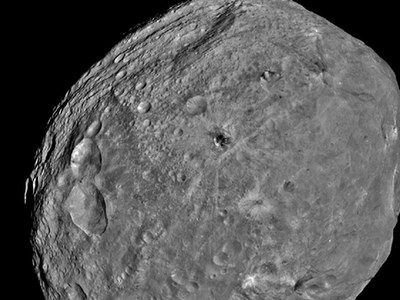After the shuttle era, space exploration continues and thrivesby Lou Friedman
|
| This is no “end” of the space program. It is a time of vital and exciting continuation of a voyage we started 50 years ago: exploring other worlds and understanding our universe. |
I saw very little from NASA, and less from the Obama Administration, to counter this view of the “end of space.” The few positive messages centered more on what wonderful things we will do on the International Space Station and with commercial industry rockets rather than a focus on the joy and discoveries of space exploration. I saw only one article by the Associated Press (not widely picked up) that expressed some hope and vision for the future. Mostly there was a lot of hand-wringing in the news coverage about American leadership being threatened.
However, since then, the United States carried out the first rendezvous with a Main Belt asteroid (or protoplanet, now that we have close up pictures of it), and launched a new Jupiter orbiter spacecraft that will fly closer than ever to the giant planet to learn about its dynamics and composition—fine examples of American leadership. We can also see American leadership at Mars as the Opportunity rover neared its Endeavour crater goal, and the Mars Reconnaissance Orbiter showed evidence of water flows on the Martian surface, enhancing possibilities for extraterrestrial life being found in our own solar system.
While it may seem like I am crowing about the importance of America leading space exploration, personally, I’d be just as excited if these accomplishments came from abroad. I am instead crowing at America’s leaders and media pundits for failing to recognize our own accomplishments. This is no “end” of the space program. It is a time of vital and exciting continuation of a voyage we started 50 years ago: exploring other worlds and understanding our universe. I wish the voyage included humans going beyond the Moon (after all, I am one)—therein lies the space policy conundrum. But in the meantime our robot emissaries are doing better and better. From Mercury to Pluto, we are, right now, conducting great adventures throughout the solar system and making discoveries, teaching us more and more about our origins, evolution, and environment. “We” is led by us Americans, but proudly it includes other nations as well. The Europeans are on the way to a comet rendezvous, the Russians are preparing an ambitious launch to the Martian moon Phobos, and the Japanese recently concluded their adventuresome Hayabusa mission and are in the process of another challenge trying to get Akatsuki back to Venus. India, China, and Japan also recently concluded successful lunar missions, and the US is about to launch a two-spacecraft lunar orbiter mission called GRAIL.
This week we should stand and cheer NASA and JPL and science teams worldwide for the Dawn mission rendezvous at Vesta, their new Mars discoveries, and the Juno launch to Jupiter. Also we cheer the Johns Hopkins Applied Physics Laboratory folks with their new results from MESSENGER at Mercury and their continuing New Horizons journey to Pluto. We should also cheer Russia for finally launching its Radioastron satellite, a mission that has been more than 20 years in the making and which may signify a return of Russian space science. Space exploration continues unabated to bring benefits and knowledge to Earth, especially to a new generation weaned more on information technology than on large rockets sending humans to space.
| If humans in space are there to seek new knowledge and explore new worlds—to extend our presence beyond Earth orbit and into the solar system—this will be a sign of leadership: by Americans, Russians, Chinese, or others. |
The Vesta encounter particularly illustrates the benefits of space exploration. It is hard to think of anything less tangible or less immediately practical than crater counting on a large rock located somewhere between Mars and Jupiter. That said, I was delighted that the encounter—almost standing alone as a positive story among other national news during the first half of August—was widely reported and that there was interest in how understanding Vesta adds to our knowledge about planetary evolution. Why the asymmetrical cratering? What happened causing the unusually larger impact crater? Why is Vesta so nearly round? How does it relate to the dwarf planets, asteroids, and even near Earth asteroids? They’re all good questions, all interesting and engaging. And even though we can’t immediately use these data to improve health care or make better smartphones, the images of a new world were welcome antidotes to a clowning Congress playing financial politics and a Fox newsman asking Bill Nye whether the presence of volcanoes on the Moon debunks global warming concerns.
Seeking new knowledge does improve our quality of life. We have to have some hope for American leadership if it is pace-setting new ventures into the solar system, seeking understanding of the origin and evolution of the planets.
No, the space program is not ending. As Justin Kugler pointed out last week, not even the human space program is ending (see “Avoiding ‘the end’ of NASA”, The Space Review, August 8, 2011). The question is: where it will go? If humans in space are there to seek new knowledge and explore new worlds—to extend our presence beyond Earth orbit and into the solar system—this will be a sign of leadership: by Americans, Russians, Chinese, or others. Charlie Bolden got it right this week when he said, “NASA is continuing to write remarkable chapters in our nation’s story of exploration with discoveries on Mars and trips to an array of challenging new destinations… Opportunity’s findings and data from the upcoming Mars Science Laboratory will play a key role in making possible future human missions to Mars and other places where humans have not yet been.”
